Imagine all the challenges of starting a modern business from scratch. You need to secure funding, recruit and hire team members, design a website, and myriad other startup tasks. These are some of the administrative and logistical challenges faced by the ad hoc, UN-mandated investigative mechanisms (“IMs”).
A relatively new UN-mandate, the goal of IMs generally is to create case-files for specific crimes and against named individual perpetrators that build a case which can then be handed off for use in potential criminal trials in national, regional, or international courts or tribunals. IMs occupy the space in between the UN fact finding missions and commissions of inquiry and the UN-back courts. Their role goes beyond the mere collection and preservation of evidence, but does not include prosecutorial power.
In 2016, the UN General Assembly established an IM for Syria to address the human rights abuses arising from the Syrian conflict. In the years since, the Syrian IM has collected evidence, consulted with survivors, and contributed to various court proceedings with some ending in convictions for serious offenses such as crimes against humanity. Following a similar model, in 2018, UN Human Rights Council created an IM for Myanmar in the wake of Rohingya genocide. Since then, there have been calls for the establishment of other ad hoc IMs to investigate the human rights situations in Iran, Belarus, and Sudan.
The creation of a new IM for a specific situation poses several challenges. Significant diplomatic capital is required to align UN member states in support of a resolution to establish one. Once formed on paper, a new IM also faces the time and start-up costs associated with getting it off the ground.
A SIIM would help to strengthen rule of law and to address impunity, including against state actors, through its investigatory capacity.
To combat these challenges, the International Commission of Jurists has led the charge for the creation of a Standing Independent Investigative Mechanism (“SIIM”) — a permanent body that can take on the role currently occupied by the ad hoc IMs and other UN-backed fact finding entities. Like the present IMs, a SIIM would document crimes under international law to be used to support criminal proceedings. However, a SIIM would include a permanent office and staff in a host country that could set up investigations when its mandate is triggered. Although there is some debate over the precise contours of a SIIM, including how an investigation would be set in motion, the permanent nature of the body will not only reduce the cost associated with IMs, but also allow the UN to respond more quickly to emergent situations by having a mechanism already in place.
Biden Should Support the SIIM
As the Biden administration seeks to make human rights “the center of our foreign policy,” it should back the creation of a SIIM as an investment that would pay dividends for the US in terms of soft power and national security. To date, the United States’ investment in the Syria and Myanmar IMs has totaled millions of dollars. With the goal of a SIIM to streamline resources, and to avoid incurring substantial additional costs, providing financial support of one would merely require the US to consolidate its investments in ad hoc IMs into the SIIM. By reducing the start-up costs and combining the logistical and administrative frameworks of each IM, each dollar invested in the SIIM would go further in supporting the investigatory mandate than it currently does invested in ad hoc IMs.
Beyond providing a better dollar-for-dollar investment, the creation of a SIIM presents the United States with an opportunity to exercise its soft power in the human rights arena. Specifically, a SIIM would help to strengthen rule of law and to address impunity, including against state actors, through its investigatory capacity. For minimal additional financial commitment, the United States could position itself as championing justice and accountability on the multilateral stage by taking the reins as a key backer of a SIIM.
The United States also stands to gain from the creation of a SIIM from a global stability perspective. With an increased capacity to take on investigations and nimbleness to start investigations more quickly than ad hoc mechanisms, a SIIM would create greater deterrence for would-be rights violators. At a macro level, the SIIM’s promotion of justice and accountability would address conflict and decrease mass atrocities, which in turn helps to protect the United States’ national security interests.
Given these potential benefits, the United States should seriously consider the proposals presented by the International Commission of Jurists in its report on the Options for the Establishment of a Standing Independent Investigative Mechanism (SIIM). A SIIM is a good investment both politically and monetarily for the United States’ foreign policy and will provide better returns than continued support of ad hoc IMs.
The views presented in this article are the author’s own and do not necessarily represent the views of any other organization.




















